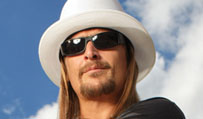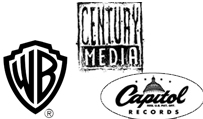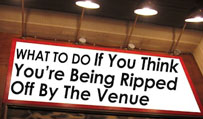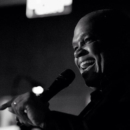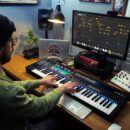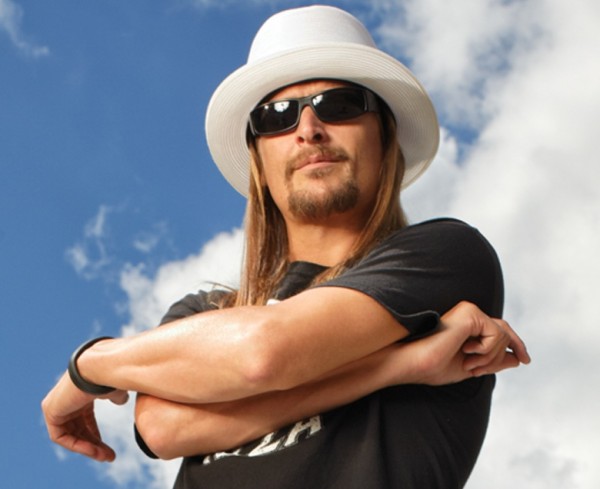
By Gary Graff
More than a decade ago, in the 2001 hit “Forever,” Kid Rock introduced us to punk rock/hip-hop/Southern rock musical manifesto. Add some blues, funk, soul and country to that, and you have the all-American mix that Rock (real name Bob Ritchie) has stirred into sales of 27 million albums worldwide with the occasional mainstream hit such as “Picture” (his duet with Sheryl Crow) and “All Summer Long,” Rock’s feel-good mash-up of Lynyrd Skynryd’s “Sweet Home Alabama” and Warren Zevon’s “Werewolves of London.” The approach is no less diverse on Rebel Soul, his recently released ninth album. Produced by Rock himself––following 2010’s Born Free with Rick Rubin––Rebel Soul covers a lot of ground, from the Southern-fried opener “Chickens in the Pen” and the over-the-top pomp of “Mr. Rock n Roll” to heavy rockers such as the first single, “Let’s Ride,” the vintage soul-rock of “Celebrate” and a joyous, Motown-spirited shout-out to his home town in “Detroit, Michigan.” There’s also plenty of Dixie moxie in the title track, “Redneck Paradise,” the mournful “Cocaine and Gin” and “Happy New Year,” while “Cucci Galore” marks a return to Rock’s hip-hop, pimp of the nation roots. Rebel Soul came toward the end of an already eventful year for Rock, which included a charity collaboration with the Detroit Symphony Orchestra––whose members sported Rock’s trademark fedora––that raised $1 million, and an open and very public endorsement of Republican presidential candidate Mitt Romney. Rebel Soul also ends Rock’s long holdout against iTunes, bringing his music into the digital world where it, no doubt, will find favor from buyers in an array of genres.
Music Connection: Nine albums in, what did you have in mind when you started making Rebel Soul?
Kid Rock: I had an idea of what I wanted to do musically for the record. After coming off the Rick Rubin record, Born Free, which was a very poignant record where everything was pretty straight and narrow across the board for me, on Rebel Soul I kinda wanted to go back to making Kid Rock records the way I’ve done it for so many years. I wanted to make kind of a greatest hits feeling record with all new songs, basically everything I’ve kind of touched on in my career to this point. I was basically just doing whatever I want to do––not listening to anybody or anything. If I wanted to get crazy and write one of the old-school Kid Rock songs, fine. That’s the way I like to make records.
MC: It certainly keeps the listeners on his toes from track to track.
Kid Rock: It’s funny; I was saying to somebody, I was trying to explain the record, and I said, “It’s really confusing––so it’s a perfect Kid Rock record.” (laughs)
MC: You do have this kind of creative fearlessness, though. Where does that come from?
Kid Rock: Sometimes I struggle between trying to grow old gracefully but at the same time saying, “Fuck growing old!” I’m still gonna say what I want and be this person. You find yourself weaving in and out of all these different paths in life, but at the end of the day I’m just going to be who I’m gonna be. I think people understand that about me at this point.
MC: You brought Rebel Soul back in-house after Born Free. What lessons did you learn making that album that you applied to this one?
Kid Rock: Just how to really not take the feel out of a song by making it too perfect, by letting musicians get in there and play and not giving them too much direction. Rick was really strict on no direction, just have everybody get in there and play, do it a couple times, talk about it, go play it three or four more times, done. Now, I like to make some more parts than that. I look at the Eagles records where they have these great parts, whether it’s a keyboard riff or a guitar line. So I took a lot of that, which I’ve been trying to do for years, and put it with Rick’s sensibility for keeping it organic and letting the song breathe. I spent a little more time making parts and stuff, but I was careful not to change the feel or start doing too much shit on Pro Tools and taking all the feel out of it. I really think I found a happy medium with everything on this record.
MC: A lot of this album was recorded at The Warehouse, your rehearsal facility. What impact did that have on the sound and feel of Rebel Soul?
Kid Rock: It totally did. What happened was we were rehearsing for some shows and we had a bunch of songs written, and we were just learning them to see how they felt live and everybody was playing really good. At the same time I was rebuilding my (AllenRoadHouse) studio and we had everything dismantled and all the gear stored up at the Warehouse. So I said, “Let’s hook this shit up and take a crack at it. If we don’t use it we don’t use it, but we’re gonna learn something about all these songs as we play ‘em, so it’s worth doing. And lo and behold, about 80 percent of them just came out and ended up being used for the bed tracks.

